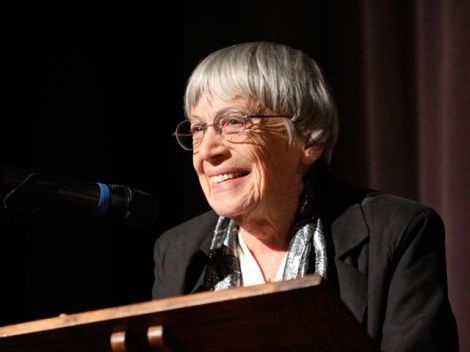Below, I reproduce some comments by Ursula Le Guin on Murray Bookchin, taken from her preface to a new collection of some of Bookchin’s writings on libertarian municipalism, communalism and direct democracy, The Next Revolution: Popular Assemblies and the Promise of Direct Democracy, edited by Debbie Bookchin (his daughter) and Blair Taylor. In Volumes Two and Three of Anarchism: A Documentary History of Libertarian Ideas, I included several excerpts from Bookchin’s anarchist writings on ecology, popular assemblies, direct democracy and direct action. Murray Bookchin has been in the news recently as one of the ideological inspirations for the experiment in direct democracy now being undertaken in Rojava in northern Syria, under attack by the Islamic State and threatened by Turkish intervention. Ursula Le Guin is a well known science fiction writer who has often dealt with ecological and anarchist themes in her books, particularly in The Dispossessed, which is about an anarchist society in exile on a moon orbiting an Earth like planet, the strains within that society and the need for a social revolution on the planet below.
Direct Democracy and the Ecological Imperative
What all political and social thinking has finally been forced to face is, of course, the irreversible degradation of the environment by unrestrained industrial capitalism: the enormous fact of which science has been trying for fifty years to convince us, while technology provided us ever greater distractions from it. Every benefit industrialism and capitalism have brought us, every wonderful advance in knowledge and health and communication and comfort, casts the same fatal shadow. All we have, we have taken from the earth; and, taking with ever-increasing speed and greed, we now return little but what is sterile or poisoned.
Yet we can’t stop the process. A capitalist economy, by definition, lives by growth; as Bookchin observes: “For capitalism to desist from its mindless expansion would be for it to commit social suicide.” We have, essentially, chosen cancer as the model of our social system.
Capitalism’s grow-or-die imperative stands radically at odds with ecology’s imperative of interdependence and limit. The two imperatives can no longer coexist with each other; nor can any society founded on the myth that they can be reconciled hope to survive. Either we will establish an ecological society or society will go under for everyone, irrespective of his or her status.
Murray Bookchin spent a lifetime opposing the rapacious ethos of grow-or-die capitalism. The nine essays in “The Next Revolution” represent the culmination of that labor: the theoretical underpinning for an egalitarian and directly democratic ecological society, with a practical approach for how to build it. He critiques the failures of past movements for social change, resurrects the promise of direct democracy and, in the last essay in the book, sketches his hope of how we might turn the environmental crisis into a moment of true choice—a chance to transcend the paralyzing hierarchies of gender, race, class, nation, a chance to find a radical cure for the radical evil of our social system.
Reading it, I was moved and grateful, as I have so often been in reading Murray Bookchin. He was a true son of the Enlightenment in his respect for clear thought and moral responsibility and in his honest, uncompromising search for a realistic hope.
Ursula Le Guin



Reblogged this on mariapapageorgiou30.
[…] was sad to hear of the death of Ursula Le Guin yesterday. I heard her speak at an international anarchist symposium in Portland, Oregon back in […]